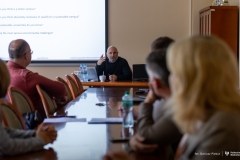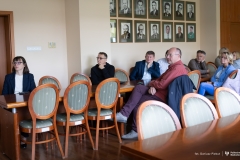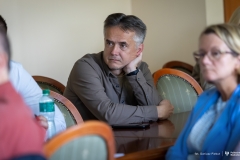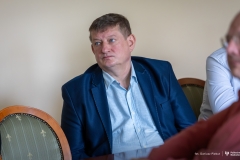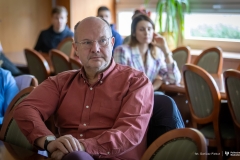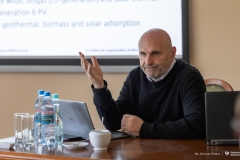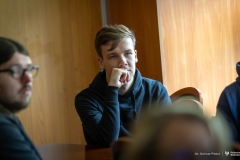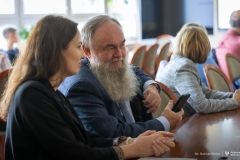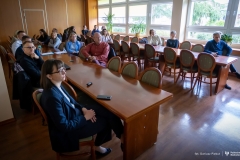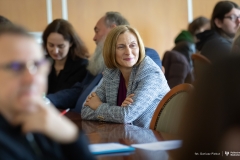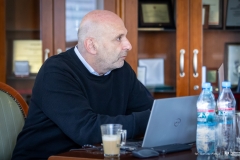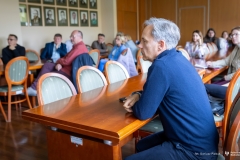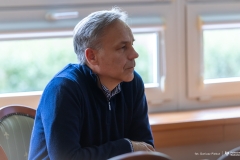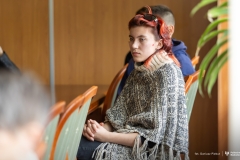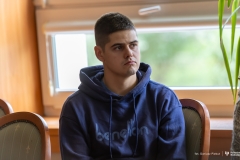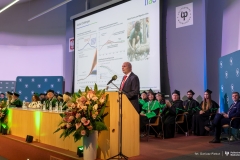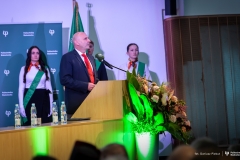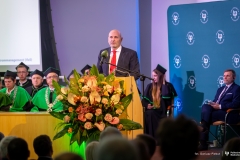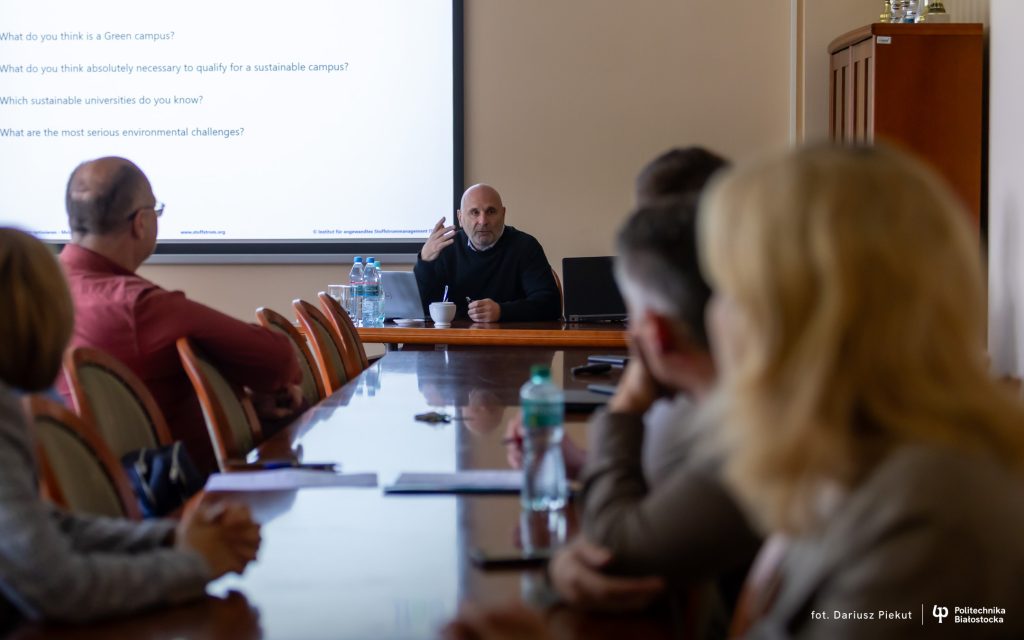
Prof. Peter Heck from Hochschule Trier (Trier University of Applied Sciences) in Germany, an international authority in the field of energy transition and sustainable development, assessed the potential of Bialystok University of Technology in its pursuit of carbon neutrality. The co-creator of Europe’s first zero-emission university campus in Birkenfeld emphasises the key role of education and knowledge exchange.
Professor, this is your second visit to Bialystok University of Technology — your first was in 2020. From today’s perspective, how do you assess our path towards a zero-emission campus?
Prof. Peter Heck: – From the perspective of technological potential and the infrastructure your university already has, you possess everything you need to become the number one green university in Poland. However, a detailed scenario for achieving this goal should begin with an in-depth analysis of the current situation – all university buildings, water and energy consumption, as well as the natural infrastructure.
Most of the buildings on the main campus of Bialystok University of Technology were constructed in the 1970s and 1980s and are being gradually modernised. Is older architecture a barrier to transformation towards sustainable development?
– The buildings on the Birkenfeld campus date back to the 1950s! We renovated and modernised them, while also constructing new ones. From the circular economy perspective, this is actually a better approach, because you are not demolishing and generating waste – you are reusing existing resources and adding value to them. It is more costly, but also more valuable from an educational standpoint – you are teaching students how to improve existing systems instead of simply removing and rebuilding them.
If we want to educate students to become change makers in future governments or companies, they must study in an environment that is already a symbol – or even a living laboratory – of those changes. If we keep them in outdated buildings and archaic systems, how can they believe they are the incubators of the future and creators of innovation? That is my philosophy, which I share with all academics: if you want intelligent students, you must have intelligent systems for them to study in.
Thanks to the cooperation between Bialystok University of Technology and Trier University of Applied Sciences, we have the opportunity to visit your campus and observe the technologies you have implemented…
– That exchange can work both ways. German students visiting Bialystok University of Technology could analyse your systems and develop ideas for improvement, while students from Bialystok could visit us to see firsthand what we have done – what worked, and what did not. Of course, we like to show our successes, but from a research point of view, it’s equally important to see what can still be improved. That is why academic exchange makes sense – for students and for staff alike. It always brings added value to both sides.
How long did it take to transform the Birkenfeld campus into a zero-emission one?
– We started planning 30 years ago and actual construction began 25 years ago. That’s when we created the infrastructure we now maintain at a high level of sustainability. The challenge is that systems degrade or lose their innovativeness over time. So we constantly work to sustain innovation – which is not easy, as we initially had substantial financial support that is smaller today. We strive every year to make our system better: more sustainable, more resilient, and more climate-friendly.
Was the entire university community involved in this process?
– Yes. We have a team led by my colleague responsible for sustainability, who prepares an annual report on our status for the UI GreenMetric World University Rankings. The team also formulates recommendations for improvement. It includes an economics professor and students from all faculties. In my institute – the Institute for Applied Material Flow Management (IFAS) – we focus on securing funding for investments and planning the implementation of new technologies.
A shared goal: the green transformation of universities
Researchers from Bialystok University of Technology have repeatedly visited Umwelt-Campus Birkenfeld, part of Trier University of Applied Sciences. It is Europe’s first zero-emission university campus and the most environmentally friendly in Germany.
During their visits, representatives of Bialystok University of Technology learned about the campus’s green infrastructure, including carbon-neutral energy and heating systems based on renewable sources. They have implemented these green models on their own campus, contributing to the creation of an important document outlining the stages of Bialystok University of Technology’s green transformation.
At the initiative of Assoc. Prof. Marta Kosior-Kazberuk, DSc, PhD, Eng., Rector of Bialystok University of Technology, and under the Strategy for the Development of Bialystok University of Technology 2021–2024 with a perspective until 2030, the university developed and began implementing the Sustainable Development Strategy “My Green University”. Under this initiative, the university has undertaken numerous actions, including building modernisation, rational water and waste management, improving working conditions and wellbeing within the academic community, and introducing new plantings.
As a result, Bialystok University of Technology was included in the UI GreenMetric World University Rankings, which assesses the environmental engagement and initiatives of universities worldwide. In 2024, the University ranked 4th among Polish universities and 382nd globally among 1,183 institutions from 84 countries. In the same ranking, the Umwelt-Campus Birkenfeld of Trier University of Applied Sciences was ranked 3rd worldwide.
Long-standing cooperation
Assoc. Prof. Piotr Banaszuk, DSc, PhD, Eng., Director of the Institute of Forest Sciences at the Faculty of Civil Engineering and Environmental Sciences of Bialystok University of Technology, spoke about the strength of the long-term collaboration between Bialystok University of Technology and Trier University of Applied Sciences.
– Cooperation with Trier University of Applied Sciences is extremely valuable, given their many years of experience in implementing circular economy practices on campus and their strong focus on applied solutions – says Prof. Banaszuk. – Trier is a university town and a regional economic centre, picturesquely located in the Moselle Valley.
According to Prof. Banaszuk, the success of Trier’s activities lies primarily in its dynamic cooperation with businesses, local authorities, and the entire economic environment.
– Everyone is working towards the same goal – emphasises Prof. Banaszuk. – The university campus serves as a laboratory for testing various solutions before they are implemented. Another strength is the interdisciplinary team of experts who carry out the university’s sustainable development concept. This process can only be implemented interdisciplinarily, involving engineers, technicians, and economists. Every great sustainability idea must ultimately lead to one result: an economically viable solution, not merely a place for subsidies. This is a lesson we can also learn from their experience.
Researchers from Trier University of Applied Sciences also often act as “mobile advisers”, travelling the world to share their expertise in energy solutions.
Seminar with Prof. Peter Heck
Trier University of Applied Sciences is home to Europe’s first zero-emission university campus in Birkenfeld. Among the specialists responsible for maintaining its infrastructure and implementing sustainable engineering systems is Prof. Peter Heck, a world expert in circular economy.
The co-creator of the green campus in Birkenfeld and initiator of numerous international projects, including Sahara Renaissance (SAREP) – aimed at re-greening 2 million hectares of desert along the Mauritanian coast – shared his experience during the seminar “Transformation towards sustainability”. He was also an honoured guest at the inauguration of the 2025/2026 academic year at Bialystok University of Technology.
Bialystok University of Technology and Trier University of Applied Sciences (Hochschule Trier) in Germany have been cooperating since 2018. The universities jointly conduct scientific, research, and educational activities and promote the idea of sustainable development.
The seminar featuring Prof. Peter Heck took place on 3 October 2025 at the Faculty of Civil Engineering and Environmental Sciences of Bialystok University of Technology. The event gathered researchers, staff, PhD students, and students of the University, as well as members of the team responsible for developing and implementing the “My Green University” sustainable development strategy.
(mr, in cooperation with Anna Werner-Juszczuk, PhD, Eng.)
See the photo gallery from the events with Prof. Peter Heck at Bialystok University of Technology: the seminar “Transformation towards sustainability” and the 2025/2026 academic year inauguration.
